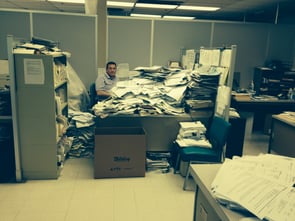
RF engineering is a branch of Electrical Engineering involving the use of electrical magnetic frequency properties to produce products that will transmit or receive these frequencies.
RF engineers can face a lot of challenges and frustration. This frustration can be caused from all the discrepancies and complex maps of components used in RF circuits.
In order to be a successful RF engineer, a few habits and processes can be formed. Here are 10 critical tips to be an efficient RF engineer.
10 Successful RF Engineering Tips
1. Keep it Simple
A common problem among engineers is over-complication. The more simplistic option can often be the best option. When starting a project, going too far into detail can call for a lot of extra time and complications. The simpler a project is, the easier it is to follow the process and obtain the end goal.
2. Set Goals

Setting goals in RF engineering can help keep you on track. When running into a problem on a project, it can be very easy to lose sight of what exactly is trying to be accomplished. You will have to overcome a lot of roadblocks in order to obtain the overall goal. By setting short term goals, solving these problems will be more efficient. To have a short-term goal of solving an immediate problem will help stay on track.
3. Expect Setbacks
Nothing ever goes as originally planned. Every project that includes RF engineering, has unforeseen problems. Don’t set your timeframe within a perfect world. Give yourself enough extra time to account for any unexpected setbacks.
4. Research, Research, Research...

It is always a good idea to research before starting a new project that you may have any uncertainties on. Especially with the rate of technological, theoretical, and practical advancements, it’s never a bad idea to stay up to date.
Having the theory of RF understood before diving into the hands-on application of the project can be the difference between failure and success. Making the connection between what was read and what is happening can allow you to understand how to better achieve your goal.
5. Teamwork
Being a lone wolf and taking all the glory for yourself isn’t a valued attribute in engineering. Your team/Co-workers are your best resource.
Being apart of a team is efficient on multiple levels. It saves time and potential problems. Every person is different which means different strengths and weaknesses.
Even within RF engineering there are many different areas. Every person on your team will have their own strengths and weaknesses in these areas.
6. Prioritize
RF engineers often have multiple roles and responsibilities. Quite often a RF engineer will have up to 10 tasks at once. Being able to sort out what tasks take priority over others is a very important skill. Deadlines and importance of the task must be considered in order to know where to spend the correct amount of time and when.
7. Stay Organized

Just like in most other careers, it’s important to stay organized. However, maybe even more so with RF engineers.
Lost or misplaced paperwork means lost work. With having multiple tasks at once every day, it can be difficult to keep track of everything that must be done. Some organization tools can be:
-
- Filing cabinets
- Holders for desk utilities
- Calendar planner
- On desk paper filer
- Free online tools
8. Time Management

Time management goes hand in hand with organization and prioritizing. Time management is the skill of knowing how to efficiently divide up the workday. Little distractions can add up throughout the day.
You can spending just 10 minutes here and there checking out an interesting ad on the internet, and before you know it, an hour of your time has been wasted. Knowing where to put your time and using that time to accomplish your goal is one of the most efficient skills a successful engineer can have.
9. Communication
Communication is one of the biggest weaknesses of many organizations. It is very easy to do your assignments and then go home. In order to operate, communication is necessary. Consistently communicating with co-workers is a very efficient way to make sure that no one re-does anyone’s work, or that a certain tasks aren't forgotten about.
10. Deep Breaths

RF Engineering can be a very stressful profession at times. In order to stay calm and focused, relaxing is required. When becoming too stressed on a certain job or task, walking away for a short segment of time can be beneficial.
Often when working on a project, Engineers will take a break to work on a different task and come back to the one at hand. This process allows the brain to stop thinking directly about the topic but will continue to subconsciously process the situation.
Want to learn more powerful secrets about how to get more done on the job (and work less)? Download our free productivity hacks infographic!






